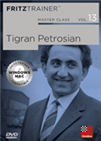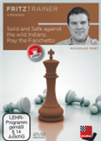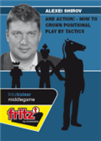Dominguez and Rapport force tiebreaks
 Out of the sixteen participants playing the first leg of the FIDE Grand Prix, four represent the United States. Remarkably, now that the group stage is almost over, we know that three of them will be in the semifinals. While Levon Aronian and Hikaru Nakamura secured their spots without needing tiebreaks, Wesley So and Leinier Dominguez are set to play rapid and blitz on Friday to decide who is the third US grandmaster who will take part in the knockout stage.
Out of the sixteen participants playing the first leg of the FIDE Grand Prix, four represent the United States. Remarkably, now that the group stage is almost over, we know that three of them will be in the semifinals. While Levon Aronian and Hikaru Nakamura secured their spots without needing tiebreaks, Wesley So and Leinier Dominguez are set to play rapid and blitz on Friday to decide who is the third US grandmaster who will take part in the knockout stage.
In the remaining pool, Richard Rapport and Radoslaw Wojtaszek will also break the tie for first in rapid games. Rapport, much like Dominguez, caught up with the former sole leader in his group by scoring a win in the sixth and final round of the double round-robin.
Friday’s playoffs will consist of two rapid games with a time control of 15 minutes for the whole game and 10-second increments from move 1. In case of a tie, another 2-game match will follow, but with a 5+3 time control. If the tie has not been broken after these four games, an Armageddon decider will be played in which White gets 5 minutes, while Black gets 4 minutes and draw odds (the players will get 2-second increments from move 61).
Pool A: Naka survives
Only Hikaru Nakamura or Andrey Esipenko could win pool A going into round 6. Alexander Grischuk and Etienne Bacrot were out of contention, but ended their participation in style, with the Russian coming out of top from a double-edged struggle. Both Grischuk and Bacrot will play in the series’ second event, scheduled to take place in Belgrade on March 1-14.
In the deciding game of the pool, Esipenko, playing white, seemed to be en route to spoil Nakamura’s strong performance of the first five rounds. The Russian had a clear positional edge in the late middlegame.
 Considered a master of prophylaxis, Petrosian sensed dangers long before they actually became acute on the board. In his prime, Petrosian was almost invincible. Let our authors introduce you into the world of Tigran Petrosian.
Considered a master of prophylaxis, Petrosian sensed dangers long before they actually became acute on the board. In his prime, Petrosian was almost invincible. Let our authors introduce you into the world of Tigran Petrosian.
White has a major space advantage and a dangerous passer on the d-file. Here Esipenko could have chosen to keep tightening the screws on Black’s position with the simple 29.cxd5, when after 29...Ne7 he can protect the pawn with 30.Qb3 — White would get a stable, lasting advantage in this line.
Instead, the 19-year-old went for activity with 29.Rf1, allowing Black to grab a pawn after 29...Ne7 30.Rf7 dxc4. Esipenko’s idea was to bring the other rook to the f-file with 31.Raf1, getting a strong initiative, and saw his plan work in his favour when Nakamura faltered two moves later, after 31...Kh8 32.R1f3
Despite being a pawn up, Black should not offer a knight trade with 32...Nc6, as Nakamura played in the game, but instead get some active play with 32...Nd5, when the minor piece controls key squares in the centre.
After the text, Esipenko did not take long to figure out that entering the major-piece endgame was favourable for him — thus 33.Nxc6 bxc6 34.e7. However, the Russian did not find the most precise way to use his initiative after 34...Kh7 35.Qf4 Rg8
Again, like on move 29, the youngster rejected the most straightforward plan, as his 36.Rg3 was not as strong as the simple 36.Qxc4. White was still better, but Nakamura is a fierce defender. By the time they reached the time control, Black had regained some coordination.
This is the position after move 40. After 41.Qxa6 Rxe7 42.Rxe7 Qxe7 White already needs to be extremely precise to convert this pure queen endgame into a win.
Naka continued to defend resourcefully, and was rewarded with a 58-move draw, which granted him first place and a spot in the semifinals.

Andrey Esipenko missed a big chance to reach the semis — the 19-year-old late replacement should be satisfied with his strong performance nonetheless
Pool B: Evaluation swings
As mentioned in our previous report, pool B was the only one that had three players in contention for first place going into round 6. Radoslaw Wojtaszek and Vladimir Fedoseev were sharing the lead, with Richard Rapport trailing a half point back. A series of potential tiebreaker scenarios were possible. On Thursday, we got to see a few of these scenarios become more (or less) likely as the players gained and lost advantages one after another.
 The King''s Indian and Grunfeld are notoriously tricky and theoretical openings. The Fianchetto variation avoids the main lines which Black players enjoy, and goes for a small but safe edge. GM Nick Pert played the Fianchetto variation for over 20 years, and at the time of recording was unbeaten with White since November 2011!
The King''s Indian and Grunfeld are notoriously tricky and theoretical openings. The Fianchetto variation avoids the main lines which Black players enjoy, and goes for a small but safe edge. GM Nick Pert played the Fianchetto variation for over 20 years, and at the time of recording was unbeaten with White since November 2011!
- First, Wojtaszek had a much better position against Grigoriy Oparin. If he won, only Fedoseev could caught him with a win.
- Then, Wojtaszek lost his edge and the Fedoseev vs. Rapport game was balanced, so a Wojtaszek vs. Fedoseev tiebreak seemed likely.
- Then, Oparin got a small edge while Rapport gained the upper hand in the other game, so it seemed like Rapport would win the group outright.
- Finally, Wojtaszek managed to hold a draw and Rapport beat Fedoseev.
In hindsight, given Rapport’s win, Wojtaszek could have got the ticket to the semis had he made the most of what he later described as “so winning”.
Black is clearly in the driver’s seat here, and needs to break through at once with 23...f4, making the most of White’s precarious king position. Instead, Wojtaszek’s 23...Qe8 gave White a chance to regroup (albeit the engines still favour Black). Oparin played the strong 24.Rc6, giving up the exchange, and the path forward was no longer so straightforward for the Polish grandmaster.
Wojtaszek was a late replacement, and nonetheless still has chances to reach the knockout ahead of very strong grandmasters. This should be considered a satisfactory performance, but as he told Michael Rahal, things could have easily gone better for him:
I think that I scored well, but I missed so many opportunities. I mean, I could easily have finished on like +3. [...] If you had asked me before the event, I would have said that +1 is a good score, but now, given what happened, it’s not as easy to say that.

Grigoriy Oparin facing Radoslaw Wojtaszek
Pool C: Keymer on the defence
Already qualified to semis, Levon Aronian kept it simple and signed a 21-draw in his game with white against Daniil Dubov. In the other encounter of the pool, though, Vidit Gujrathi and Vincent Keymer fought until move 72, as the German youngster defended an inferior queenless position for more than 30 moves.
As seen in the diagrammed position, Vidit got a clear space advantage and tried hard to break through, but Keymer did not falter in defence. For the German, this was an important result, given the fact that he had lost his previous three games in a row.
Talking to Michael Rahal, the local representative in Berlin noted that he needs to work on his openings, since he found himself all but lost in the initial phase of the game two of the three times he got the black pieces.

Two ambitious rising stars — Vidit Gujrathi and Vincent Keymer
Pool D: Dominguez beats Shirov
Much like Wojtaszek in pool B, Wesley So could have moved on to the semifinals at once by converting a superior position in round 6 — albeit his advantage was not near as clear as Wojtaszek’s. As it happened, the draw So signed with Pentala Harikrishna allowed Leinier Dominguez to tie for first after beating Alexei Shirov with the white pieces.
Shirov played boldly from the get go. Dominguez did not try to refute his opponent’s plan in the most forcing ways, but did get a big advantage on the clock. Once the queens left the board, the Cuban-born star gave up a pawn for activity, getting a superior position.
 There are few names which, like that of Alexei Shirov, can be associated with fantastically imaginative and tactically influenced play. Now the Latvian grandmaster is presenting a DVD on precisely that element of the game of chess. And one that is completely based on his own games.
There are few names which, like that of Alexei Shirov, can be associated with fantastically imaginative and tactically influenced play. Now the Latvian grandmaster is presenting a DVD on precisely that element of the game of chess. And one that is completely based on his own games.
Already on the back foot, Shirov here faltered with 27...a5, since opening up the position ended up favouring his opponent, who had the more active pieces — White’s dark-squared bishop is particularly strong in comparison to its counterpart on g7.
The game continued 28.bxa5 bxa5 29.Ne7+ Nxe7 30.Rxe7 Bh6
The rest is easy for White: 31.Rxc7+ Kb8 32.Re7+ (discovered check) Rxg3 33.hxg3 and Shirov resigned. The living legend from Riga will play in the series’ second leg, in Belgrade.
Links


















 Out of the sixteen participants playing the first leg of the FIDE Grand Prix, four
Out of the sixteen participants playing the first leg of the FIDE Grand Prix, four 




